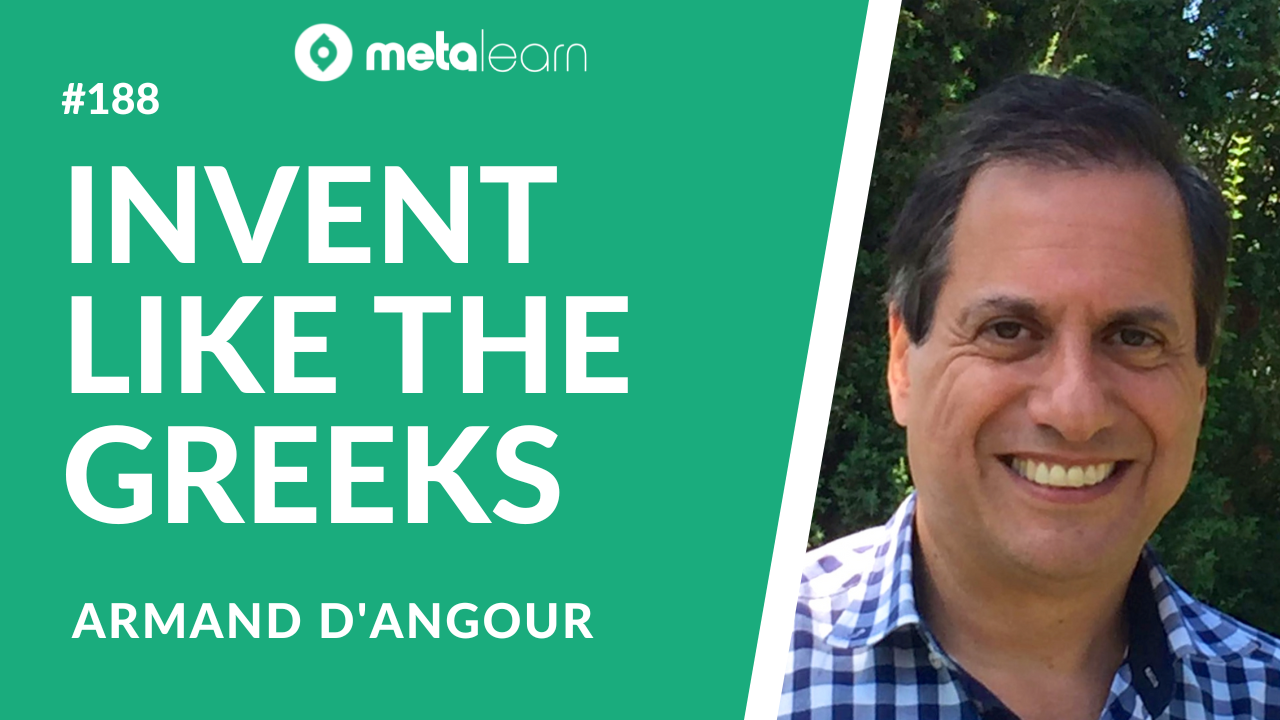ML188: Armand D'Angour on How To Innovate, Lessons from the Ancient Greeks and The Philosophy of Change
Discover the 3 different types of innovation and how to use them to your advantage, how the Greeks thought about change and the relationship between innovation and ethics.

Armand D’Angour is a professor of classics and a fellow of Jesus College at the University of Oxford.
He is the author of Socrates in Love and The Greeks and the New, has lectured widely on innovation at business schools and even managed a family manufacturing business before becoming a classics professor.
When it comes to innovation and creative thinking, we are still catching up with the ancient Greeks.
Between 800 and 300 BC, they changed the world with astonishing inventions—democracy, the alphabet, philosophy, logic, rhetoric, mathematical proof, rational medicine, drama, lifelike sculpture, and competitive athletics.
None of this happened by accident.
They recognised the power of creating new things and tried to understand and promote the conditions that made it possible. The Greeks were the first to write extensively about innovation and we can still learn a great deal from them when it comes to innovating.
Armand's latest book, How to Innovate: An Ancient Guide to Creative Thinking captures some of the best ideas about innovation and creative thinking from Ancient Greece, drawing on the work of Aristotle, Diodorus, and Athenaeus. It’s the foundation for this episode and in it we discuss:
- The 3 different types of innovation and how to use them to your advantage
- How the Greeks thought about change and what we can learn from them
- The relationship between innovation and ethics and what it means for technological progress
We also cover the true story behind Archimedes’ famous “Eureka!” moment, Aristotle’s thoughts on political innovation, and how the Theban General’s winning strategy against the Spartans changed military strategy forever. There is a lot of great insight in here, even if you’re not as into the Ancient Greeks as I am.
Show Notes
- How did the concept of novelty in the ancient world come into play when Armand took over the family manufacturing business? [00:33]
- How does language affect how people perceive the concept of the new? [05:36]
- Why did the Greeks equate new to bad? Who dictates the definition of new? [09:19]
- What is the material principle of origins as believed by different philosophers? [13:57]
- How do Empedocles’ principles of love and strife illustrate the origins of change? [17:31]
- Why did Parmenides believe that change does not exist and is only an illusion? [18:52]
- Why is Aristotle the best philosopher to base the principle of innovation on? [20:45]
- How is critique an important element to innovation and how do we apply it to different structures in society? [26:30]
- How can we prompt ethical conversations around technological innovations as demonstrated possible by the Greeks? [29:29]
- What are the conditions and the mechanisms necessary for innovation as shown by Archimedes’ discovery of buoyancy? [33:00]
- What are some inaccuracies to the story of Archimedes’ Eureka moment? [36:51]
- Why did the Greeks have minimal innovations in commerce and business compared to the modern world? [42:48]
- What events led to the decline and the revival of the dissemination of knowledge from Greek history through medieval Italy? [50:50]
- Are the current sources of knowledge and information, namely the academia and the media, conducive to the innovation of new ideas? [56:10]
- How does Armand navigate the classics through his teaching and his studies while maintaining a candid yet fresh perspective? [01:00:32]
- In what ways is Socrates the best model of a true disruptive character? [01:06:01]
- Is foundational knowledge of a field necessary for innovation? [01:09:20]
- What can Aristotle teach us about bringing forth innovation in today’s partisan conversations around politics? [01:13:59]
- What are ideas and principles from the Greeks that we can apply to our self-improvement process? [01:18:38]
- Closing remarks [01:21:57]
Resources
Follow Armand online
- How to Innovate: An Ancient Guide to Creative Thinking (Ancient Wisdom for Modern Readers) by Armand D'Angour
- Socrates in Love: The Making of a Philosophere by Armand D’Angour
- The Greeks and the New: Novelty in Ancient Greek Imagination and Experience by Armand D’Angour
- In the Grip of the Past: Essay on an Aspect of Greek Thought by Bernhard Abraham Groningen

